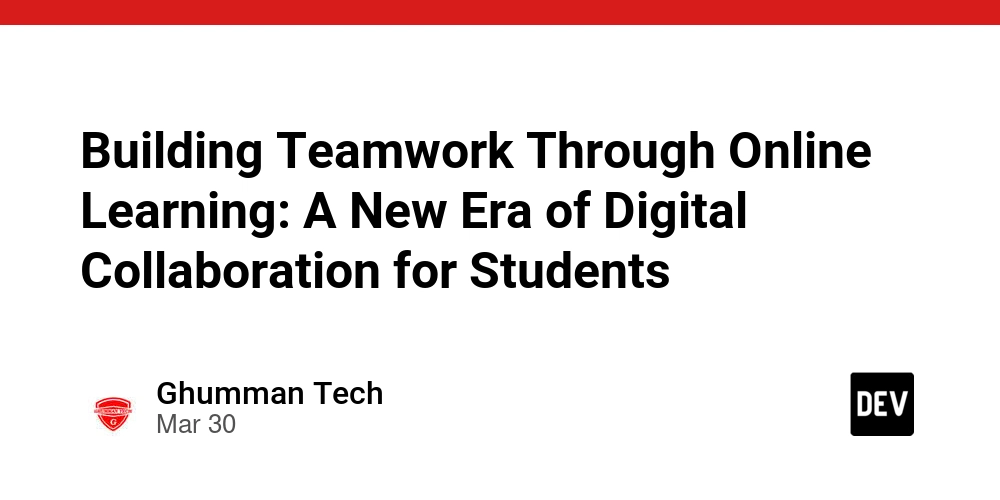Building Teamwork Through Online Learning: A New Era of Digital Collaboration for Students
Title: Fostering Teamwork through Online Learning Platforms In today's evolving educational landscape, online learning platforms are becoming increasingly prevalent. These platforms are revolutionizing traditional teaching and learning methods, allowing students to learn at their own pace, in their own space. Amidst the diverse benefits, one striking feature that we need to focus on is how online learning platforms are cultivating a new sense of teamwork among students, providing opportunities for enhanced collaboration and communication. Traditionally, teamwork was fostered through face-to-face activities in classrooms wherein students engaged in group projects or discussions, experiencing the dynamics of collaborative effort firsthand. However, the digital era has shifted these collaborative activities into the virtual domain, thereby opening new potentials for teamwork even without physical proximity. Online learning platforms offer a multitude of features that support collaborative learning. Discussion boards, shared digital whiteboards, breakout rooms for group discussions, and group assignments are just a few features that promote teamwork. Beyond the confines of the traditional classroom, these virtual environments enable students to interact, exchange ideas, problem solve and work together towards shared objectives. One of the ways online learning platforms encourage teamwork is through group assignments and projects. Here, diverse students, who may be miles apart, come together to accomplish a common goal. This not only enhances their coordination and communication skills but also exposes them to various perspectives, thereby fostering a global understanding. Moreover, platforms like Google Classroom, Microsoft Teams, and Canvas provide cloud-based document storage and sharing capabilities. This feature allows students to co-create, edit, and review projects in real time, which cultivates shared responsibility and mutual respect for each other’s work. Further, using online discussion forums and instant messaging, students can collectively solve problems, brainstorm ideas, and engage in constructive debates. These interactions often nurture a sense of belonging, mutual respect, and understanding among team members. In an unstructured but equally fulfilling setting, these forums push for the exploration of multiple viewpoints leading to well-rounded solutions. Moreover, peer assessment is yet another feature that promotes teamwork and enhances a learner’s critical evaluation skills. Tasked with evaluating each other’s work, students become more mindful about the shared duties, fostering greater accountability and reliability amongst each other. In addition, online learning platforms are not confined by time zones or geographical barriers. This benefits students who might be spread across different locations, as they can collaborate seamlessly. This exposure to different cultures and practices further enhances the dynamics of teamwork, making it a more enriched experience. With the advancement of digital tools like project management applications and shared calendars, online learning platforms aid in teaching students how to distribute tasks, manage time effectively and work interdependently - a tutorial that is essential in today’s professional sphere which is marked by remote and flexible working conditions. While online learning does require certain adjustments, it is undeniable that it pushes the boundaries of the traditional educational landscape and opens up new avenues for learning. By promoting active collaboration, shared responsibility, mutual respect and understanding, online learning platforms are cultivating an evolved sense of teamwork amongst students, preparing them for a digitally connected professional world. In conclusion, while the lack of face-to-face interaction might seem like a hindrance, online learning platforms are indeed aiding in fostering a renewed and inclusive sense of teamwork, underlined by global exposure and digital competency. It’s clear that the future of collaborative learning rests largely in the digital realm, where new skills are being discovered and honed.

Title: Fostering Teamwork through Online Learning Platforms
In today's evolving educational landscape, online learning platforms are becoming increasingly prevalent. These platforms are revolutionizing traditional teaching and learning methods, allowing students to learn at their own pace, in their own space. Amidst the diverse benefits, one striking feature that we need to focus on is how online learning platforms are cultivating a new sense of teamwork among students, providing opportunities for enhanced collaboration and communication.
Traditionally, teamwork was fostered through face-to-face activities in classrooms wherein students engaged in group projects or discussions, experiencing the dynamics of collaborative effort firsthand. However, the digital era has shifted these collaborative activities into the virtual domain, thereby opening new potentials for teamwork even without physical proximity.
Online learning platforms offer a multitude of features that support collaborative learning. Discussion boards, shared digital whiteboards, breakout rooms for group discussions, and group assignments are just a few features that promote teamwork. Beyond the confines of the traditional classroom, these virtual environments enable students to interact, exchange ideas, problem solve and work together towards shared objectives.
One of the ways online learning platforms encourage teamwork is through group assignments and projects. Here, diverse students, who may be miles apart, come together to accomplish a common goal. This not only enhances their coordination and communication skills but also exposes them to various perspectives, thereby fostering a global understanding.
Moreover, platforms like Google Classroom, Microsoft Teams, and Canvas provide cloud-based document storage and sharing capabilities. This feature allows students to co-create, edit, and review projects in real time, which cultivates shared responsibility and mutual respect for each other’s work.
Further, using online discussion forums and instant messaging, students can collectively solve problems, brainstorm ideas, and engage in constructive debates. These interactions often nurture a sense of belonging, mutual respect, and understanding among team members. In an unstructured but equally fulfilling setting, these forums push for the exploration of multiple viewpoints leading to well-rounded solutions.
Moreover, peer assessment is yet another feature that promotes teamwork and enhances a learner’s critical evaluation skills. Tasked with evaluating each other’s work, students become more mindful about the shared duties, fostering greater accountability and reliability amongst each other.
In addition, online learning platforms are not confined by time zones or geographical barriers. This benefits students who might be spread across different locations, as they can collaborate seamlessly. This exposure to different cultures and practices further enhances the dynamics of teamwork, making it a more enriched experience.
With the advancement of digital tools like project management applications and shared calendars, online learning platforms aid in teaching students how to distribute tasks, manage time effectively and work interdependently - a tutorial that is essential in today’s professional sphere which is marked by remote and flexible working conditions.
While online learning does require certain adjustments, it is undeniable that it pushes the boundaries of the traditional educational landscape and opens up new avenues for learning. By promoting active collaboration, shared responsibility, mutual respect and understanding, online learning platforms are cultivating an evolved sense of teamwork amongst students, preparing them for a digitally connected professional world.
In conclusion, while the lack of face-to-face interaction might seem like a hindrance, online learning platforms are indeed aiding in fostering a renewed and inclusive sense of teamwork, underlined by global exposure and digital competency. It’s clear that the future of collaborative learning rests largely in the digital realm, where new skills are being discovered and honed.









































































































































































![[The AI Show Episode 142]: ChatGPT’s New Image Generator, Studio Ghibli Craze and Backlash, Gemini 2.5, OpenAI Academy, 4o Updates, Vibe Marketing & xAI Acquires X](https://www.marketingaiinstitute.com/hubfs/ep%20142%20cover.png)



























































































































![[FREE EBOOKS] The Kubernetes Bible, The Ultimate Linux Shell Scripting Guide & Four More Best Selling Titles](https://www.javacodegeeks.com/wp-content/uploads/2012/12/jcg-logo.jpg)



![From drop-out to software architect with Jason Lengstorf [Podcast #167]](https://cdn.hashnode.com/res/hashnode/image/upload/v1743796461357/f3d19cd7-e6f5-4d7c-8bfc-eb974bc8da68.png?#)






































































































.png?#)




.jpg?#)
































_Christophe_Coat_Alamy.jpg?#)







































































































![Rapidus in Talks With Apple as It Accelerates Toward 2nm Chip Production [Report]](https://www.iclarified.com/images/news/96937/96937/96937-640.jpg)









































































































































